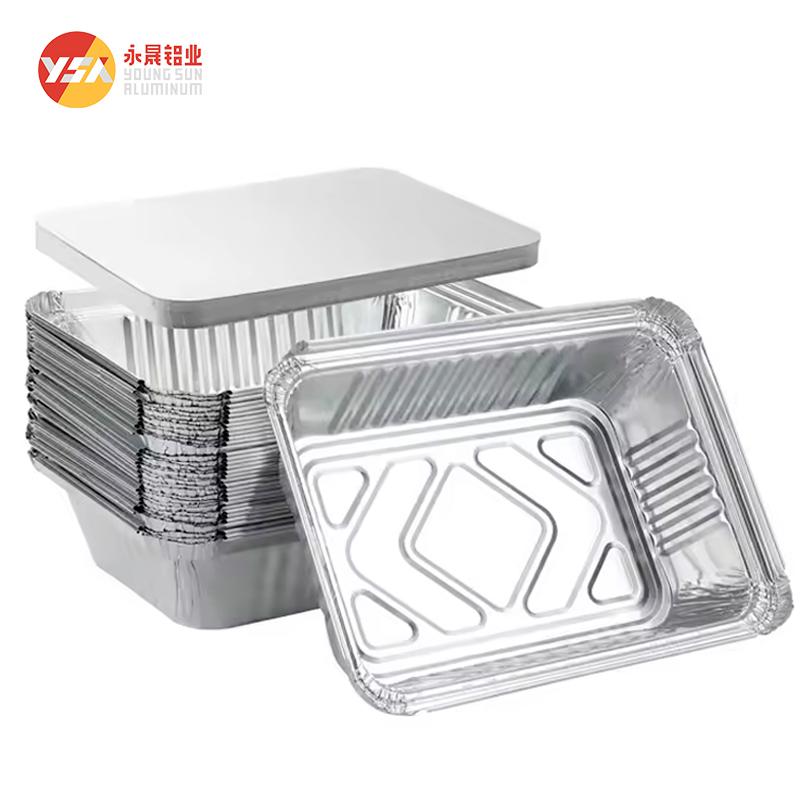Introduction to Aluminum Foil Trays
Aluminum foil trays are a culinary marvel! They combine practicality with versatility, making them indispensable in both professional kitchens and home cooking. Whether you're preparing a feast for family or hosting a barbecue, these trays lend themselves to an array of uses.
Aluminum foil is not just for wrapping leftovers. It's a material that reflects heat, resists moisture, and is lightweight, which makes it ideal for various cooking methods. Baking, roasting, grilling—aluminum foil trays excel in all these domains.
From catering to meal prepping, these trays find their way into all kinds of culinary applications. They are perfect for baking casseroles, transporting dishes, or even as a makeshift grill pan. Their adaptability is truly remarkable!
Understanding Aluminum Foil Tray Sizes
Selecting the right size of aluminum foil tray is crucial for ensuring perfect cooking results. Different sizes cater to different needs, and understanding these dimensions can elevate your cooking experience.
Choosing the right size can impact cooking time and food presentation. A tray that’s too small may overflow, while an excessively large one can lead to uneven cooking. Hence, size matters!
Aluminum foil trays come in various sizes, typically categorized as small, medium, large, and extra-large. Each category serves distinct culinary purposes, which we will explore in detail.
Aluminum Foil Tray Sizes Chart
Small Trays
Small trays usually measure around 9 x 7 inches and can hold approximately 1 to 2 quarts of food. They are perfect for side dishes or individual servings.
Ideal for appetizers, desserts, or small portions of casseroles, small trays are great for picnics or potlucks. Their compact size makes them easy to transport and store.
Medium Trays
Typical Dimensions and Capacities
Medium trays are generally 12 x 10 inches and can accommodate 2 to 4 quarts. They strike a balance between practicality and capacity.
Best Uses for Medium Trays
These trays are fantastic for main courses like lasagna or roasted vegetables. Their size is also well-suited for a family dinner or gatherings where food needs to be served in larger quantities.
Large Trays
3.3.1 Typical Dimensions and Capacities
Large trays often measure 16 x 12 inches and can hold 4 to 8 quarts. They are robust and designed for hearty meals.
Best Uses for Large Trays
Perfect for serving a crowd, large trays work wonders for buffet-style dining or barbecues. They can accommodate larger cuts of meat or multiple side dishes.
Extra-Large Trays
Typical Dimensions and Capacities
Extra-large trays usually measure 18 x 12 inches and can hold 8 quarts or more. These trays are the giants of the aluminum foil world.
Best Uses for Extra-Large Trays
Ideal for catering events or large family gatherings, extra-large trays can handle substantial quantities of food. Whether it’s a whole turkey or a massive vegetable platter, these trays are up to the task.
Specialty Aluminum Foil Trays
Divided Trays
Divided trays feature multiple compartments, allowing for the separation of different food items. Perfect for meal prep or serving a variety of dishes at once!
Deep-Dish Trays
Deep-dish trays are designed with higher sides to accommodate foods that require more depth, such as lasagna or deep-dish pizza. They are a game-changer for baking enthusiasts.
Bakeware Trays
These trays are specifically designed for baking, often with reinforced edges to withstand the rigors of the oven. They are ideal for cookies, brownies, and other baked delights.
Choosing the Right Aluminum Foil Tray
Factors to Consider
When selecting an aluminum foil tray, several factors should be taken into account to ensure optimal results.
Purpose and Use
Determine what you plan to cook. Are you baking, roasting, or serving? Knowing the purpose will guide your size choice.
Food Type
Consider the type of food you are preparing. Some dishes require more space or depth, while others can be compact.
Cooking Method
Different cooking methods may necessitate specific tray sizes. Grilling may require a larger surface area, whereas baking might benefit from a deeper dish.
Benefits of Using Aluminum Foil Trays
Convenience and Portability
Lightweight and disposable, aluminum foil trays are perfect for on-the-go meals. They make cleanup a breeze after gatherings or picnics.
Heat Conductivity
Aluminum is an excellent conductor of heat. This property ensures even cooking, reducing the chances of burnt edges or undercooked centers.
Recyclability
Aluminum foil trays are recyclable, making them an environmentally friendly choice. After use, they can be cleaned and tossed into the recycling bin.
Tips for Using Aluminum Foil Trays
Best Practices for Cooking
To maximize the effectiveness of aluminum foil trays, preheat your oven and avoid overcrowding the tray. This will ensure even heat distribution and optimal cooking.
Storage and Maintenance Tips
Store trays flat to prevent warping. If you plan to reuse trays, ensure they are thoroughly cleaned and dried before stacking.
Conclusion
Aluminum foil trays come in a variety of sizes, each serving a unique purpose. Understanding these dimensions can help enhance your culinary endeavors. With their versatility, convenience, and eco-friendliness, aluminum foil trays are a staple in any kitchen. Selecting the right size is essential for achieving delightful culinary results, and now you are equipped with the knowledge to make informed choices!



